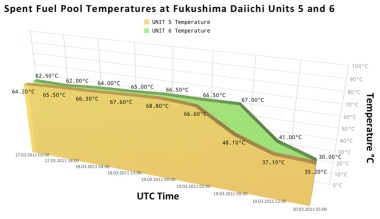Fukushima
In the associated WNN report, is the following IAEA graph of unit 5, 6 fuel pond temperatures.
At units 1 and 2, external power has been restored. Tokyo Electric Power Company (Tepco) said it would restore functions in the central control room shared by the units so that accurate readings could again be taken from the reactor system. Next, workers will check the condition of the water supply systems to the reactor and the used fuel pond. With luck these will be able to go back into operation as they had been immediately after the earthquake on 11 March.
External power for units 3 and 4 should be in place ‘in a few days’ time’, said Tepco.
(…) Despite contradictory comments by the US Nuclear Regulatory Commission to US politicians and media, most observers in nuclear industry and regulation consider the measures taken by Japanese authorities to be prudent and appropriate.
At the MIT Nuclear Science and Engineering site, the 20 March status update is encouraging. Included in the report was a note on the actual tsunami heights at the reactor sites:
The Fukushima power plants were required by regulators to withstand a certain height of tsunami. At the Daiichi plant the design basis was 5.7 metres and at Daini this was 5.2 metres.
Tepco has now released tentative assessments of the scale of the tsunami putting it at over 10 metres at Daiichi and over 12 metres at Dainii.
Offsite grid power has been brought to the Daiichi site, and is in the process of connection to each reactors equipment.
Restoration of Grid
Progress has been achieved in restoring external power to the nuclear power plant, although it remains uncertain when full power will be available to all reactors. Off-site electrical power has been connected to an auxiliary transformer and distribution panels at Unit 2. Work continues toward energizing specific equipment within Unit 2.
Here’s an excerpt on radiation measurements:
Radiation levels near Fukushima Daiichi and beyond have elevated since the reactor damage began. However, dose rates in Tokyo and other areas outside the 30-kilometre zone remain below levels which would require any protective action. In other words they are not dangerous to human health.
_Seekerblog
21 March 2011 update from Brave New Climate blog
IAEA 20 March update on Japan Earthquake
Status report from FEPC of Japan (English)
Carnival of Nuclear Energy #44 at CoolHandNuke deals with Fukushima (via BrianWang)
Nuclear Town Hall Updates
The situation in Japan points out the need for improvement in backup systems and power supplies for nuclear power plants in the face of overwhelming natural disasters. At the same time, it highlights the relative safety of even 30-year-old reactor designs.
Now if only Obama's NRC would get off its pompous, lazy, ideological bureaucratic ass and help the US (and the world) move into a newer, safer age of nuclear power by certifying newer, safer reactor designs.
Cross-posted from Al Fin
Labels: Fukushima reactors incident, nuclear power


0 Comments:
Post a Comment
Subscribe to Post Comments [Atom]
<< Home